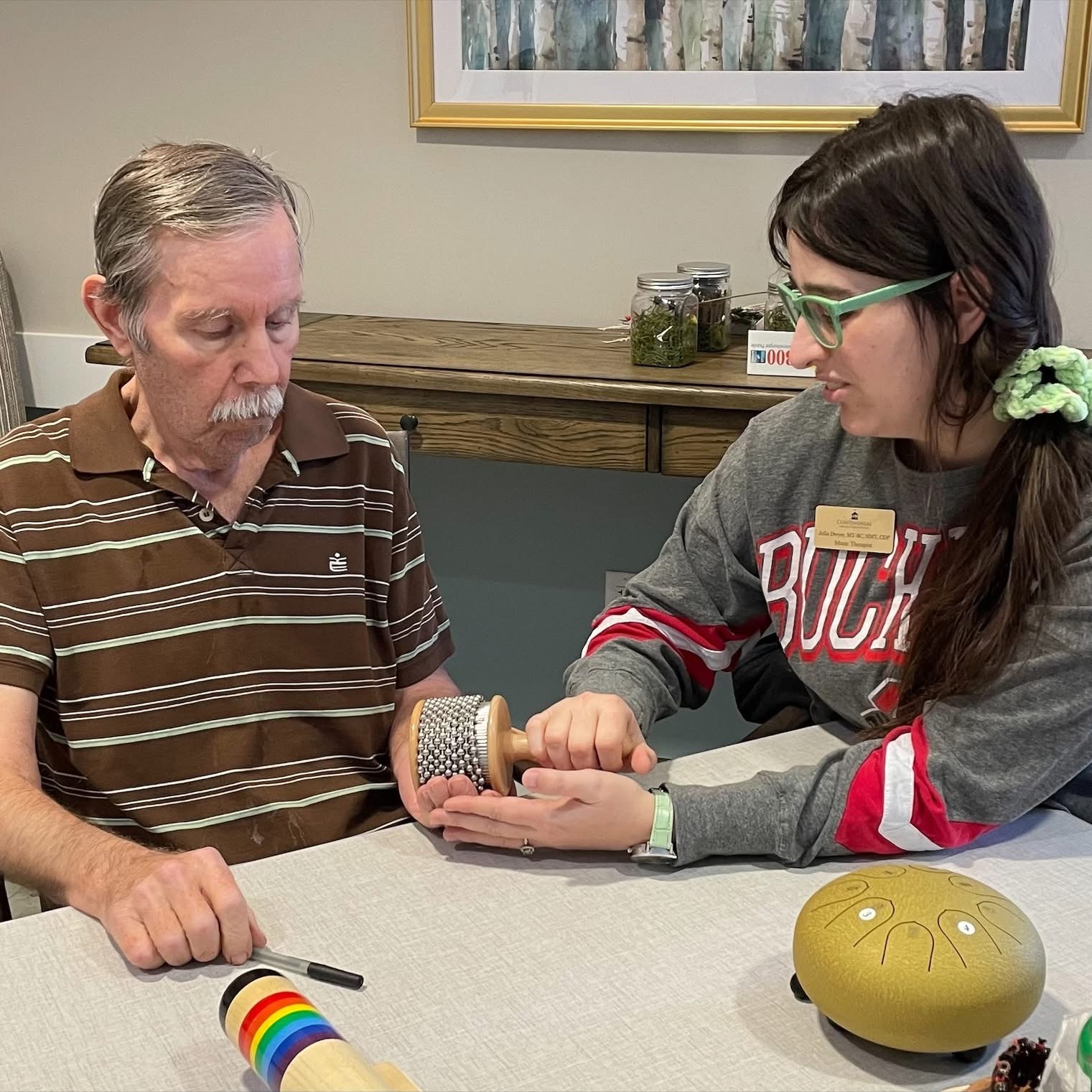
How Music Therapy Supports Memory and Well-Being at The Ganzhorn Suites
Why Music Matters in Dementia Care
Scientific studies have shown that music stimulates multiple areas of the brain, including regions linked to long-term memory, speech, movement, and emotion.¹ In people living with Alzheimer’s disease or related dementias, this means that music can often reach parts of the brain that remain functional even after other areas are affected by the disease.
At The Ganzhorn Suites, we integrate music therapy as a therapeutic experience – not just entertainment. The rhythms, melodies, and familiar lyrics provide powerful moments of recognition, comfort, and connection for our residents.
What Is Music Therapy?
Music therapy is a clinical intervention that uses music to support individualized health, cognitive, and emotional goals. It is not simply music-based programming but – it is facilitated by a certified music therapist who is trained to assess, plan, and deliver targeted interventions.
Sessions may include:
- Singing to promote speech and memory recall
- Movement-based activities for coordination and mobility
- Musical improvisation or listening for emotional expression
- Group music-making to foster social engagement and joy
Every session is tailored to meet each resident’s unique needs, preferences, and abilities.
How Music Therapy Works in Dementia Care
Unlike traditional therapies, music taps into deep neural pathways that often remain accessible, even in advanced stages of memory loss. Residents may respond to a favorite song with unexpected verbalization, initiate movement to a beat, or share stories triggered by familiar melodies.
These responses aren’t just nice moments – they’re clinical milestones in memory stimulation, emotional regulation, and meaningful engagement.
Meet Our Therapist: Julia Dwyer, MT-BC
Julia Dwyer serves as our full-time music therapist and brings a remarkable depth of expertise to The Ganzhorn Suites. She is:
- Board-certified and state-licensed
- A Neurologic Music Therapy (NMT) provider
- A Certified Dementia Practitioner (CDP)
Julia’s role extends across both The Ganzhorn Suites and our sister community, Dublin Glenn Memory Care. While her expertise is shared, her sessions at Ganzhorn are customized to the residents here and respect each person’s musical history, cultural background, and clinical needs.
The Clinical and Emotional Benefits of Music Therapy
Residents who participate in music therapy at The Ganzhorn Suites benefit in four key areas:
- Memory Activation: Music can trigger long-term memories and improve recall.
- Cognitive Engagement: Activities like singing and rhythmic response stimulate speech, focus, and problem-solving.
- Mobility and Coordination: Movement to music supports balance and motor function.
- Emotional and Social Connection: Group music-making releases oxytocin, creating a sense of comfort and community.
Many family members tell us they’ve “seen a glimpse” of their loved one again during these sessions through a smile, a laugh, or a lyric remembered. These are the moments that matter most.
Why We Invest in a Certified Music Therapist
Having a music therapist on staff sets The Ganzhorn Suites and Dublin Glenn apart. Julia works closely with our interdisciplinary care team to align therapy sessions with residents’ care plans, goals, and progress. She also collaborates with families to create memory-based music experiences to help residents reconnect with the soundtrack of their lives.
Schedule a Visit and See the Impact for Yourself
Music therapy is more than a program — it’s a meaningful expression of how we care at The Ganzhorn Suites. We welcome you to visit and experience how music is bringing moments of clarity, connection, and comfort to the people who call our community home.
Contact us today to learn more about our enrichment programs and advanced memory care services.
